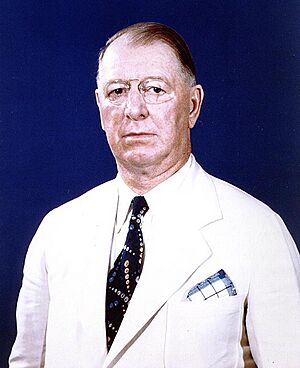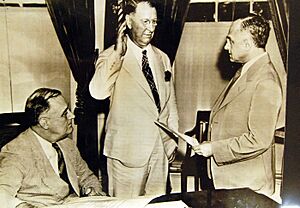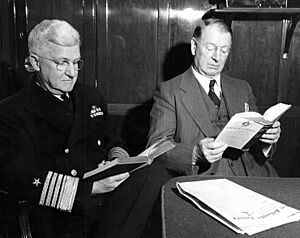Frank Knox facts for kids
William Franklin Knox (January 1, 1874 – April 28, 1944) was an American politician, soldier, and newspaper owner. He was the Republican candidate for Vice President in 1936. Later, he served as the Secretary of the Navy under President Franklin D. Roosevelt during most of World War II. On December 7, 1941, Knox was the one who told President Roosevelt that Japan had attacked Pearl Harbor.
Quick facts for kids
Frank Knox
|
|
|---|---|

Knox, c. 1940s
|
|
| 47th United States Secretary of the Navy | |
| In office July 11, 1940 – April 28, 1944 |
|
| President | Franklin D. Roosevelt |
| Preceded by | Charles Edison |
| Succeeded by | James Forrestal |
| Personal details | |
| Born |
William Franklin Knox
January 1, 1874 Boston, Massachusetts, U.S. |
| Died | April 28, 1944 (aged 70) Washington, D.C., U.S. |
| Resting place | Arlington National Cemetery |
| Political party | Republican |
| Spouse | Annie Reid |
| Education | Alma College (BA) |
| Military service | |
| Allegiance | |
| Branch/service | United States Army |
| Years of service | 1898 1917–1919 |
| Rank | Colonel |
| Battles/wars | Spanish–American War • Battle of Las Guasimas • Battle of San Juan Hill World War I |
Born in Boston, Frank Knox went to Alma College. He fought with the Rough Riders during the Spanish–American War. After the war, he became a newspaper editor. He was a strong supporter of Theodore Roosevelt. Knox also served as an officer in the Army during World War I. In 1936, he ran for Vice President but lost the election.
When World War II began in 1939, Knox wanted the U.S. to help the Allies. In 1940, President Roosevelt chose him to be the Secretary of the Navy. Knox helped make the U.S. Navy much stronger. He served as Secretary of the Navy until he died in 1944.
Contents
Early Life and Military Service
William Franklin Knox was born in Boston, Massachusetts. His parents were from Canada. When he was nine, his family moved to Grand Rapids, Michigan. His father owned a grocery store there.
Knox attended Alma College in Michigan. He left college early to join the US Army. He fought in the Spanish–American War in Cuba. He was part of Theodore Roosevelt's famous Rough Riders. Knox fought in battles like Battle of Las Guasimas and Battle of San Juan Hill. After the war, he finished his studies and earned a degree.
Newspapers and Political Career
After his military service, Knox became a newspaper reporter. This was the start of his career in the newspaper business. Around 1900, he began using the name Frank instead of William.
He became a leader in the Republican Party in Michigan. In 1912, he helped Theodore Roosevelt in his campaign for president. Knox later helped start a newspaper in New Hampshire. This paper became very successful.
During World War I, Knox believed the U.S. should join the war. When the U.S. declared war in 1917, he rejoined the Army. He became a Colonel and served in France as an artillery officer. After the war, he returned to his newspaper work.
In 1931, Frank Knox became the publisher of the Chicago Daily News. In the 1936 election, he was the Republican candidate for Vice President. He ran with Alf Landon for president. They lost the election to President Franklin D. Roosevelt.
Serving During World War II

As World War II started, Knox strongly supported helping the Allies. He did not agree with isolationism, which meant staying out of other countries' problems. In July 1940, President Roosevelt asked him to be the secretary of the Navy. This was to show that both major political parties supported the war effort.
Knox worked to expand the US Navy greatly. He wanted a navy strong enough to fight in both the Atlantic and Pacific oceans. He traveled a lot to visit Navy bases around the world.
After the attack on Pearl Harbor, Knox worked to improve the Navy's leadership. He brought in Admiral Ernest J. King, who was a very strong leader. During the war, Knox also continued to oversee his newspaper, the Chicago Daily News. He served as Secretary of the Navy until his death in 1944.
Knox and Japanese Americans
Frank Knox had expressed concerns about Japanese Americans even before the war. After the attack on Pearl Harbor, he visited Hawaii. He believed that some people there had helped the attackers. He reported this to the President, though later investigations by the FBI found no evidence of such actions. Knox continued to support keeping Japanese Americans away from coastal areas. He also did not allow them to serve in the Navy during the war.
Death
Frank Knox died on April 28, 1944, in Washington, DC. He had a series of heart attacks while still serving as Secretary of the Navy. He was buried at Arlington National Cemetery in Arlington, Virginia.
Honors and Memorials
After his death, a Gearing|destroyer|1 ship was named in his honor. It was called the USS Frank Knox (DD-742).
In 1945, President Harry S. Truman awarded him the Medal for Merit. This was a high honor for his service. He also received medals for his military service in the Spanish-American War and World War I.
In 1948, his wife, Annie Reid Knox, created the Frank Knox Memorial Fellowships. These fellowships help students from different countries study at Harvard University. They also help Harvard graduates study in countries of the British Commonwealth of Nations. A school at the Patuxent River Naval Air Station was also named after him.
See also
- List of U.S. political appointees who crossed party lines
- Ed J. Davenport, handled public relations for Frank Knox, 1929–32
 | James B. Knighten |
 | Azellia White |
 | Willa Brown |


